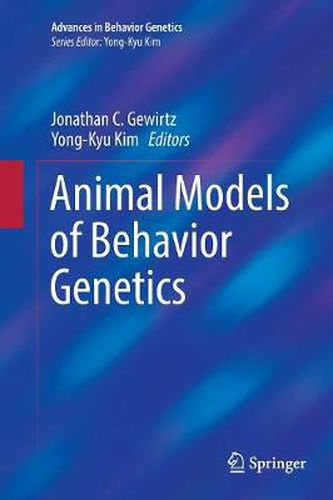Readings Newsletter
Become a Readings Member to make your shopping experience even easier.
Sign in or sign up for free!
You’re not far away from qualifying for FREE standard shipping within Australia
You’ve qualified for FREE standard shipping within Australia
The cart is loading…






This title is printed to order. This book may have been self-published. If so, we cannot guarantee the quality of the content. In the main most books will have gone through the editing process however some may not. We therefore suggest that you be aware of this before ordering this book. If in doubt check either the author or publisher’s details as we are unable to accept any returns unless they are faulty. Please contact us if you have any questions.
This stimulating analysis reviews the broad potential of animal models to foster a deeper understanding of human pathology, strengthen connections between genetic and behavioral studies, and develop more effective treatments for mental disorders. Widely-studied and lesser-used species are examined in models that capture features along the continuum of normative and pathological behavior. The models highlight genetic causes of core features, or endophenotypes, of developmental, internalizing, and externalizing disorders, as well as dementia. Expert contributors address questions ranging from how suitable species are chosen for study to the costs and benefits of using inbred versus outbred strains, and the effects of housing environment on subject animals. Larger issues addressed include how to evaluate the applicability of animal behavioral models to the human condition and how these models can harness emerging molecular technologies to further our understanding of the genetic basis of mental illness.
Included in the coverage:
Mating and fighting in Drosophila.
Attachment and social bonding.
Impulsivity in rodents and humans.
Animal models of cognitive decline.
Animal models of social cognition.
Future directions for animal models in behavioral genetics.
A detailed map of where this evolving field is headed, Animal Models of Behavior Genetics shows geneticists, molecular biologists, and cognitive neuroscientists paths beyond established concepts toward a more knowledgeable and collaborative future.
$9.00 standard shipping within Australia
FREE standard shipping within Australia for orders over $100.00
Express & International shipping calculated at checkout
This title is printed to order. This book may have been self-published. If so, we cannot guarantee the quality of the content. In the main most books will have gone through the editing process however some may not. We therefore suggest that you be aware of this before ordering this book. If in doubt check either the author or publisher’s details as we are unable to accept any returns unless they are faulty. Please contact us if you have any questions.
This stimulating analysis reviews the broad potential of animal models to foster a deeper understanding of human pathology, strengthen connections between genetic and behavioral studies, and develop more effective treatments for mental disorders. Widely-studied and lesser-used species are examined in models that capture features along the continuum of normative and pathological behavior. The models highlight genetic causes of core features, or endophenotypes, of developmental, internalizing, and externalizing disorders, as well as dementia. Expert contributors address questions ranging from how suitable species are chosen for study to the costs and benefits of using inbred versus outbred strains, and the effects of housing environment on subject animals. Larger issues addressed include how to evaluate the applicability of animal behavioral models to the human condition and how these models can harness emerging molecular technologies to further our understanding of the genetic basis of mental illness.
Included in the coverage:
Mating and fighting in Drosophila.
Attachment and social bonding.
Impulsivity in rodents and humans.
Animal models of cognitive decline.
Animal models of social cognition.
Future directions for animal models in behavioral genetics.
A detailed map of where this evolving field is headed, Animal Models of Behavior Genetics shows geneticists, molecular biologists, and cognitive neuroscientists paths beyond established concepts toward a more knowledgeable and collaborative future.